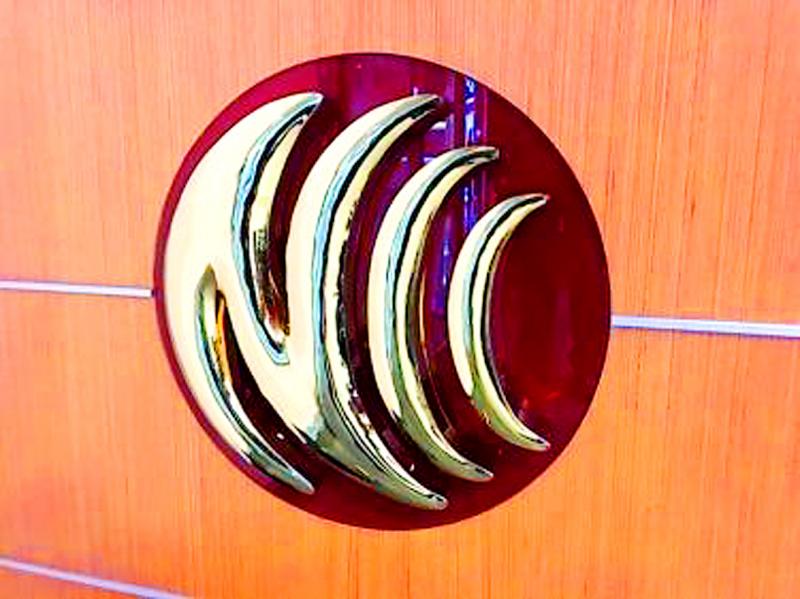The National Communications Commission (NCC) yesterday said it has approved the sale of 20 5G-compatible phone models in Taiwan, including nine models that have not yet been released.
Since 5G services were launched in Taiwan on July 1, demand for monthly plans has remained low, with consumers deterred by high prices, limited network coverage and a narrow choice of available phones.
Eleven 5G-compatible phone models are currently available in Taiwan — seven made by Samsung, two by Oppo, and one phone each by Sony and LG.

Photo: Wu Po-wei, Taipei Times
Nine of them cost between NT$20,000 and NT$40,000, while two of the Samsung models cost as little as NT$12,000.
An NCC official, who asked to remain anonymous, said that consumers would soon have a broader range of options, as the commission has approved the sale of 20 more models.
Several industry insiders have also expressed confidence that 5G phone sales would increase when new and more affordable phones are brought to market in the second half of the year.
Phone sales in the first half of the year totaled 2.9 million, falling short of forecasts, as demand was most likely affected by the COVID-19 pandemic, Far EasTone consumer business vice president Andy Tu (杜偉昱) said.
In the second half of the year, sales are expected to rebound to 3.6 million, with the release of the new iPhones and other models, which would also drive up demand for 5G service plans, Tu said.
Meanwhile, Chunghwa Telecom’s sale of monthly 5G plans is still under 100,000, company chairman Hsieh Chi-mao (謝繼茂) said, adding that the slow sales were likely due to the high cost of 5G-compatible phones.
The second half of the year would be the turning point for the company’s 5G business when more moderately priced phones become available, including Apple’s new iPhone models in late September or early October, Hsieh said.
Taiwan’s HTC Corp is scheduled to release a 5G-compatible phone by the end of the month, while Chinese brand Huawei has received conditional NCC approval for the sale of one of its models.
However, Chinese brands are still facing uncertainties over the approval of their models, as a new NCC regulation bans the use of language deemed to “harm national dignity,” prohibiting brands from describing Taiwan as part of China in their terms and conditions.
The rule, passed in an amendment to Article 20 of the Compliance Approval Regulations of Telecommunications Terminal Equipment (電信終端設備審驗辦法) in March, also allows the NCC to revoke approvals if any such language is found on a product, its packaging, instruction manual or software.
However, the NCC has already approved the sale of 5G phone models made by Chinese companies, NCC Vice Chairman Wong Po-tsong (翁柏宗) said.

The Ministry of Economic Affairs has fined Taobao NT$1.2 million (US$36,912) for advertisements that exceed its approved business scope, requiring the Chinese e-commerce platform to make corrections in the first half of this year or its license may be revoked. Lawmakers have called for stricter enforcement of Chinese e-commerce platforms and measures to prevent China from laundering its goods through Taiwan in response to US President Donald Trump’s heavy tariffs on China. The Legislative Yuan’s Finance Committee met today to discuss policies to prevent China from dumping goods in Taiwan, inviting government agencies to report. Democratic Progressive Party Legislator Kuo Kuo-wen (郭國文) said

The Ministry of Economic Affairs has fined Taobao NT$1.2 million (US$36,900) for advertisements that exceeded its approved business scope and ordered the Chinese e-commerce platform to make corrections in the first half of this year or its license would be revoked. Lawmakers have called for stricter supervision of Chinese e-commerce platforms and more stringent measures to prevent China from laundering its goods through Taiwan as US President Donald Trump’s administration cracks down on origin laundering. The legislature’s Finance Committee yesterday met to discuss policies to prevent China from dumping goods in Taiwan, inviting government agencies to report on the matter. Democratic Progressive Party

Taiwan and its Pacific ally Tuvalu on Tuesday signed two accords aimed at facilitating bilateral cooperation on labor affairs, according to Taiwan’s Ministry of Foreign Affairs (MOFA). The governments inked two agreements in Taipei, witnessed by Foreign Minister Lin Chia-lung (林佳龍) and visiting Deputy Tuvaluan Prime Minister Panapasi Nelesone, MOFA said in a news release. According to MOFA, the agreements will facilitate cooperation on labor issues and allow the two sides to mutually recognize seafarers’ certificates and related training. Taiwan would also continue to collaborate with Tuvalu across various fields to promote economic prosperity as well as the well-being of their

Sung Chien-liang (宋建樑), who led efforts to recall Democratic Progressive Party (DPP) Legislator Lee Kun-cheng (李坤城), was released on bail of NT$80,000 today amid outcry over his decision to wear a Nazi armband to questioning the night before. Sung arrived at the New Taipei District Prosecutors’ Office for questioning in a recall petition forgery case last night wearing a red armband bearing a swastika, carrying a copy of Adolf Hitler’s Mein Kampf and giving a Nazi salute. Sung left the building at 1:15am without the armband and covering the book with his coat. Lee said today that this is a serious